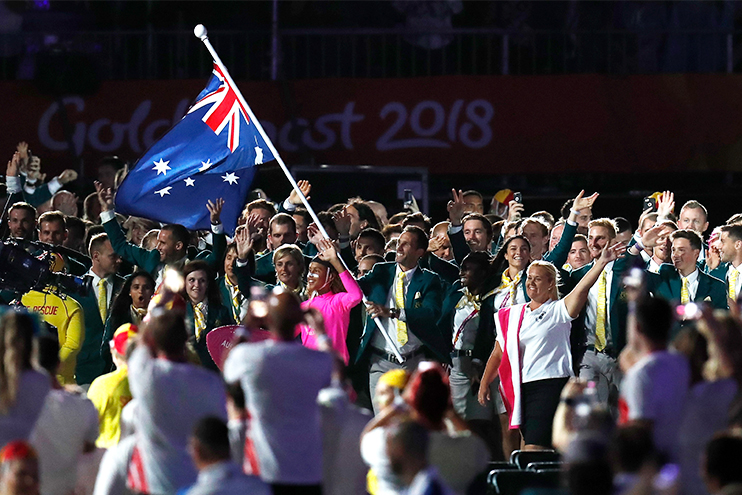
Commonwealth Games Australia chief executive officer Craig Phillips says downgrading the importance of the Commonwealth Games and resultant funding cuts foreshadowed by the Australian Institute of Sport will jeopardise Australia’s performance in Birmingham in 2022 and beyond.
Speaking to the Weekend Australian, Phillips said that many of Commonwealth Games Australia’s member sports have expressed serious concerns for the future of their pathway, development and high performance programs and the ability to contribute to Australia’s team performance in Birmingham in light of the shift in approach by the AIS.
This is despite the importance of the Commonwealth Games being highlighted in the updated National High Performance Sports Strategy released last year which focusses on Olympic, Paralympic and Commonwealth Games outcomes.
“Other countries used to look at us and say, ‘how do they do that?’” Phillips told the Weekend Australian.
“‘How does Australia produce those results?’ But we have lost our edge there and now we risk not even getting to the status quo.”
It was reported last week that Commonwealth Games and Olympic sports are facing funding cuts — some more than 60 per cent — and athlete preparations for Tokyo and Birmingham 2022 are under strain due to the revised funding arrangements.
“Kids who are aspiring to go to the Commonwealth Games in Birmingham and then on to the Paris Olympics are facing having their dreams interrupted or dashed — by not having adequately funded programs to support them,” Phillips said.
“What we are finding in our conversations with the AIS and sports, is one of the concerns we have is that our sports’ funding will be determined on what they are likely to do at the Paris Olympics in 2024.
“We know that for some of them, they are unlikely to win many medals in Paris, but they are likely to be significant contributors in the medal tally at the Commonwealth Games.
Phillips said he welcomed the approach from Sport Australia chair John Wylie to raise the concerns of Commonwealth Games Australia and its members sports with the Sport Australia board.
“We have expressed our concern about this to the AIS. The conversations are ongoing. The worry we have is we won’t get that No 1 ranking on the medal tally in Birmingham because of the current funding situation.”
Phillips acknowledged the AIS was “challenged by the funding envelope” they had been given by the government. But he also believes there needs to be a longer-term focus and less emphasis on gold medals in Paris for a stronger future for Australian sport.
“I think they are making more short-term decisions than doing long-term planning because of the funding envelope they’ve got,” Phillips said. “I think those short-term decisions will be detrimental to sport down the track.”
Phillips pointed out that for some of Australia’s most brilliant athletes the Commonwealth Games was their “first Games” — with stars such as cyclist Anna Meares and Jodie Henry breaking through. He also pointed to champion pole vaulter Steve Hooker winning gold at the Melbourne Commonwealth Games then winning Olympic gold two years later.
“Our history is littered with athletes who have launched their careers at the Commonwealth Games,” he said.
“Over the longer term I know the AIS’s ambition is to put more sports in positions of winning Olympic medals. You’ve got to find a way of supporting aspiring Olympians, through the Commonwealth Games — develop them to become Olympic medallist.”
Commonwealth Games Australia sports funding background
Commonwealth Games Australia continues to fund member sports and athletes via a range of programs designed to complement, not replace, sports funding from Sport Australia and the Australian Institute of Sport.
In April 2019 Commonwealth Games Australia announced a $13 million funding package to assist with preparations for the 2022 Commonwealth Games in Birmingham.
The total 2019-2022 funding includes $2 million in direct athlete support in the final 18 months leading into the 2022 Commonwealth Games. The remaining $11 million will fund initiatives which will most likely contribute to the aspiration of being the number one nation in Birmingham.
The initial grants program consists of $4.5 million in project funding for Birmingham 2022 sports for projects in 2019 and 2020 targeting pre-elite athletes who have their sights set on the 2022 Games and targets pre-elite and ‘next generation’ athletes who have their sights set on the Games in Birmingham.
The funding is targeted at able body and para-sport athletes for projects that are focused on the Commonwealth Games, and includes specific 2022 campaign funding, which will come after the Tokyo Olympic Games.
Included in this is $25,000 each year for the Kurt Fearnley Scholarships that assist young para-sport athletes in conjunction with the Carbine Club of NSW.
Between 1996 and 2018 Commonwealth Games Australia provided in excess of $43 million to its members and athletes. The funding comes entirely from income from investments held in the Australian Commonwealth Games Foundation, sponsorship rights sales and fundraising activities and has been boosted by legacies of hosting home Games in Melbourne and the Gold Coast.
The funding is designed to complement rather than replace or replicate any other sources of funding such as via Sport Australia or the AIS. And in some sports where Olympic related funding is minimal, this funding provides a lifeline for their athletes and the sport.
Australia topped the medal tally on the Gold Coast with 198 medals, including 80 gold, well ahead of England with 135 medals/45 gold. In Glasgow four years earlier, it was a different tale, with England topping the tally with 174/58 to Australia’s 137/49.
